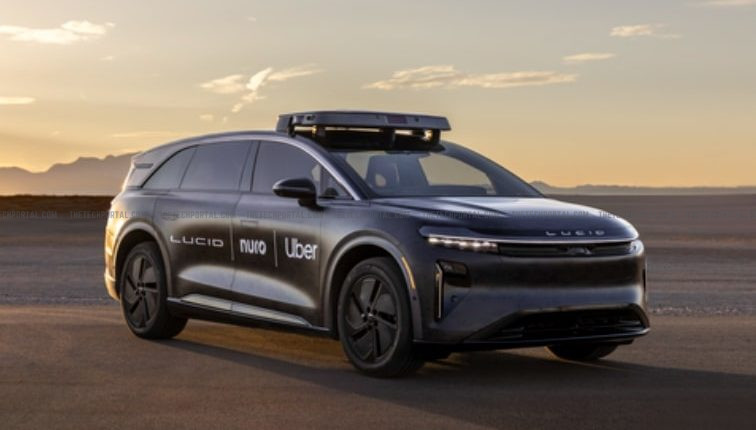Uber has announced a $300 million investment in electric vehicle company Lucid Motors as part of a major plan to launch a new fleet of self-driving electric taxis (aka robotaxis). The partnership also includes Nuro, a California-based tech company that specializes in autonomous driving systems. Under the agreement, the ride-hailing giant will also purchase at least 20,000 of Lucid’s upcoming Gravity SUVs, which will be equipped with Nuro’s self-driving technology and used as robotaxis through Uber’s app.
The first batch of the Uber-Lucid-Nuro robotaxi fleet is expected to hit the streets in 2026. Uber plans to deploy the fleet initially in at least one major US city, although the specific cities under consideration have not yet been announced.
The robotaxis will be powered by Level 4 autonomous driving systems, which means they will be able to operate without a human driver under specific conditions. Lucid will manufacture the vehicles at its factory in Arizona, where they will be built with Nuro’s sensors and software already integrated into the design. According to the companies, a working prototype has already been developed and is undergoing testing at Nuro’s closed track in Las Vegas.
The investment makes Uber the second-largest shareholder in Lucid Motors, behind only Saudi Arabia’s Public Investment Fund. Even after the announcement, Lucid’s stock price jumped by over 50% before regular trading began. The partnership is part of Uber’s larger strategy to expand its services using electric and autonomous vehicles. Notably, the company sold its self-driving unit, Advanced Technologies Group (ATG), to Aurora Innovation in 2020. And now, rather than developing the tech itself, the company is primarily focusing on integrating third-party autonomous systems into its platform.
In recent years, the Dara Khosrowshahi-led company has formed similar alliances with companies like Waymo, Volkswagen, and Baidu. But with Lucid and Nuro, the company plans to offer a more premium robotaxi experience using high-end electric SUVs.
At the same time, for Lucid, the partnership provides a major boost at a time when many EV startups are facing financial pressure. The guaranteed purchase of 20,000 vehicles over six years gives the company a reliable stream of revenue and greater production volume. Also for Nuro, the move marks a shift from focusing on autonomous delivery to transporting passengers for the first time.
This deal comes as the robotaxi industry is heating up. Tesla has already begun testing its own driverless ride service in Austin, Texas, and is preparing to officially unveil its robotaxi in August 2025. Similarly, Alphabet’s Waymo is continuing to grow its operations in Phoenix and San Francisco, while Amazon-owned Zoox is planning to launch services in Las Vegas. This is all happening at a time when the global robotaxi market is set to grow from $2.77 billion in 2024 to over $150 billion by 2034.
The Tech Portal is published by Blue Box Media Private Limited. Our investors have no influence over our reporting. Read our full Ownership and Funding Disclosure →






